I am a first-generation American, of Armenian descent. My father's father was born in Samson, his wife in Dichranagerg. When my grandparents were just children, the Turks betrayed their neighboring Armenia and slaughtered a million and a half of my people in a documented attempt to exterminate us. My great-grandparents on my father's side were killed in that brutal massacre. Near-East Relief, an English orphanage, took in my grandmother. My grandfather did not look distinctively Armenian and was able to conceal his Armenian ancestry. He remained in Turkey as a boy, able to keep his deadly secret because he was fluent in Turkish. The pressure of living in such secrecy amongst the people who had murdered his parents and 8 siblings would be inconceivable for most of us today.
By the early 1920s he had saved enough money to relocate to France, where he met my grandmother, who had by then come to Paris by way of Marsailles. In Paris, my grandfather started a men's clothing store after WW2. In the late 1950's my parents met, in Chicago, IL, and were married. My father's parents sold the business then, and came from to Chicago from France with my 16 year old aunt, Zabelle, to be with their son, and other daughter, and to meet and my mother, their new daughter-in-law. There they remained until their deaths. My grandfather passed away on on Jan. 1, 1986 , and my grandmother yas been gone since Sept. 13, 1993.
My earliest recollections of a family life are of going to my paternal grandparent's apartment on Sundays. There, my grandmother would slave away at the stove and oven all day, my aunts and mother occassionally being allowed to help her as she worked her love on some tasty and amazing dishes. I appreciate them now, and miss the smells and tastes of my grandmother's kitchen immensely. Today I'd give just about anything for one more of grandmama's boraks. At the time, though, they were just grandma's cooking.
On those Sundays, my grandfather would pull out his guitar or mandolin, and lounge about at a huge wood dining table. As is the custom of most Europeans, we would sip at wine (mine watered,) as we spoke of anything and everything and nothing. Beliefs, nastalgia, politics, philosophies, business ideas, they would all be tossed about as we enjoyed the company of our family. Several languages would be spoken at the same time, the speaker choosing the word from whichever language most accurately described the concept or thing, always careful to only use those terms which all others present understood. My grandparents spoke 7 languages, my father and aunts at least 4 . Of course, if a word wasn't know, they'd learn it in this fashion. Only now, as I reach towards my 38th year, do I truly realize how rich those weekends were, filled with laughter and discourse, music, food, and love. Armenians are an intensely passionate people. Although it would seem they were always fighting, there was the absolute security of belonging, the fierce kinship that only comes to an oppressed people
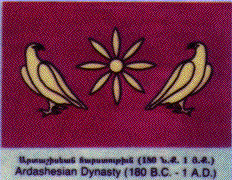 My Armenian heritage is a rich one of learned, intelligent people with
a strong work ethic and a personal integrity which demanded excellence in
everything they did. Before the Turks tried to exterminate my people and
took over what is now the Eastern half of Turkey, the Armenian people had
peacefully ruled that region of the Middle-east for over 4,000 years. When
the Romans and Greeks came, they saw the wisdom of the Armenian people,
and left them in charge. During the Holy Wars, Armenia, which was the first
nation to declare itself Christian, was the refueling point for the European
warriors. Armenians were a rich people, being good businessmen and hard
workers, but they were peaceful.
My Armenian heritage is a rich one of learned, intelligent people with
a strong work ethic and a personal integrity which demanded excellence in
everything they did. Before the Turks tried to exterminate my people and
took over what is now the Eastern half of Turkey, the Armenian people had
peacefully ruled that region of the Middle-east for over 4,000 years. When
the Romans and Greeks came, they saw the wisdom of the Armenian people,
and left them in charge. During the Holy Wars, Armenia, which was the first
nation to declare itself Christian, was the refueling point for the European
warriors. Armenians were a rich people, being good businessmen and hard
workers, but they were peaceful.
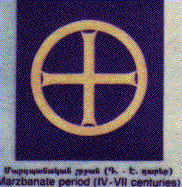 When the Turks invaded, Armenia did not even have an
army. Those young Armenians who felt the call to such things joined the
Turkish army, as the Turks and the Armenians lived side-by-side as brothers
back then. How much worse the betrayal when those soldiers were ordered
to surrender their arms, then lined up and shot into trenches. I can only
imagine the horrors of those soldiers' families who were told their men
had been transferred to the South, then made to march 1/4 of a mile from
the Euphrates river, but not allowed to go to it to drink. Those families
were intentionally killed along the way, denied water and food under the
scorching sun. Accounts tell of soldiers grabbing infants from their mothers'
arms, of the mothers reaching out for their children, only to have their
arms hacked off by the brutal and barbaric prisoners the Young Turk party
released to be soldiers in their filthy deed. The tales tell of those soldiers
bursting into homes and slaughtering men, women and children in their beds.
Why? What could cause such hatred? Greed? Envy? For the life of me, I cannot
understand.
When the Turks invaded, Armenia did not even have an
army. Those young Armenians who felt the call to such things joined the
Turkish army, as the Turks and the Armenians lived side-by-side as brothers
back then. How much worse the betrayal when those soldiers were ordered
to surrender their arms, then lined up and shot into trenches. I can only
imagine the horrors of those soldiers' families who were told their men
had been transferred to the South, then made to march 1/4 of a mile from
the Euphrates river, but not allowed to go to it to drink. Those families
were intentionally killed along the way, denied water and food under the
scorching sun. Accounts tell of soldiers grabbing infants from their mothers'
arms, of the mothers reaching out for their children, only to have their
arms hacked off by the brutal and barbaric prisoners the Young Turk party
released to be soldiers in their filthy deed. The tales tell of those soldiers
bursting into homes and slaughtering men, women and children in their beds.
Why? What could cause such hatred? Greed? Envy? For the life of me, I cannot
understand.
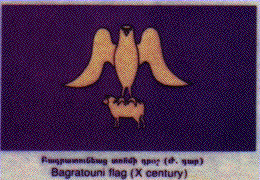 Even today, the Turks deny that any of this occurred,
insisting upon their lies though the rest of the world holds record of the
gruesome truth. Visitors to Istambul who ask about Armenian architecture
are told that there is none. If that visitor insists, asking what all the
architecture is around them, their guide will say it's Turkish, though the
Turks came down from the mountains on ponies and had no architecture of
their own. There is an Armenian church in Istambul, because Turkey has freedom
of religion. It exists for the one day every year which that "free"
country allows it to open its doors. But the cabbie will never be able to
quite remember where it is. In denying the incident and presence of our
ancient culture, they seek to wipe out any evidence that Armenians ever
existed. To me, this is the most hurtful act of all. There can be no closure
for us while they stubbornly attempt to deceive the world this way, arrogantly
continuing to deny responsibility for the brutal near-annialation of a peaceful
people who lived beside them as their Christian brothers.
Even today, the Turks deny that any of this occurred,
insisting upon their lies though the rest of the world holds record of the
gruesome truth. Visitors to Istambul who ask about Armenian architecture
are told that there is none. If that visitor insists, asking what all the
architecture is around them, their guide will say it's Turkish, though the
Turks came down from the mountains on ponies and had no architecture of
their own. There is an Armenian church in Istambul, because Turkey has freedom
of religion. It exists for the one day every year which that "free"
country allows it to open its doors. But the cabbie will never be able to
quite remember where it is. In denying the incident and presence of our
ancient culture, they seek to wipe out any evidence that Armenians ever
existed. To me, this is the most hurtful act of all. There can be no closure
for us while they stubbornly attempt to deceive the world this way, arrogantly
continuing to deny responsibility for the brutal near-annialation of a peaceful
people who lived beside them as their Christian brothers.
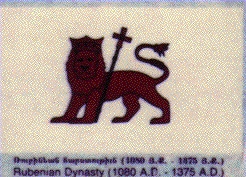 I do not forget my heritage. I cannot. I am reminded
of it every day in the mirror. My dark features, pronounced nose, full lips,
they all tell me daily where I came from. Each time I pick up my guitar,
I remember my grandfather, Nighan Hagop, and my grandmother, Nevart (Rose).
When I sign a check or legal document, I am reminded again. When people
ask me how my last name is pronounced, I give them the old-tongue YezE-gool-eYan.
Surprisingly enough for one so committed to tolerance, when I meet a Turk,
something in my blood begins to simmer. And when I hear their lies, I cannot
remain in the room. Is this too bitter, or only appropriate for the last
members of a nearly exterminated people who were so rich in arts and traditions,
whos only wrong was in trusting the neighbors they called friends? The question
is rhetorical. I cannot forget, nor can I forgive until the descendents
of the people who performed those attrocities on me and my ancestors admit
their barbaric crimes and make a credible attempt to make amends.
I do not forget my heritage. I cannot. I am reminded
of it every day in the mirror. My dark features, pronounced nose, full lips,
they all tell me daily where I came from. Each time I pick up my guitar,
I remember my grandfather, Nighan Hagop, and my grandmother, Nevart (Rose).
When I sign a check or legal document, I am reminded again. When people
ask me how my last name is pronounced, I give them the old-tongue YezE-gool-eYan.
Surprisingly enough for one so committed to tolerance, when I meet a Turk,
something in my blood begins to simmer. And when I hear their lies, I cannot
remain in the room. Is this too bitter, or only appropriate for the last
members of a nearly exterminated people who were so rich in arts and traditions,
whos only wrong was in trusting the neighbors they called friends? The question
is rhetorical. I cannot forget, nor can I forgive until the descendents
of the people who performed those attrocities on me and my ancestors admit
their barbaric crimes and make a credible attempt to make amends.
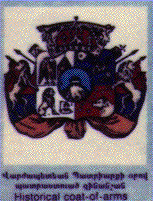 Some have asked how I and others of my blood can still hold a grudge
over something which happened so long ago. Eighty-one years is not that
long. "Why would you be offended by something which does not affect
you," they ask. But it does. It affects me in the rigid lack of affection
from my father, who never learned how to be close with his son because his
parents never had the opportunity to learn it from theirs. It affects me
for all the rich heritages that run in my veins but are largely forgotten
by the world. And it affects me when, because of the Turk's actions, most
of the world has no idea what I'm talking about when I tell them I am Armenian.
"Iranian," they ask, as if they had misheard. "No, Armenian,"
I reply, emphasizing the first syllabel. "Oh, one of those Slavic countries,
then." For a nation as sophisticated as ours, which carried on through
thousands of years and survived three empires to be forgotten in only 80
years is far more than coincidence.
Some have asked how I and others of my blood can still hold a grudge
over something which happened so long ago. Eighty-one years is not that
long. "Why would you be offended by something which does not affect
you," they ask. But it does. It affects me in the rigid lack of affection
from my father, who never learned how to be close with his son because his
parents never had the opportunity to learn it from theirs. It affects me
for all the rich heritages that run in my veins but are largely forgotten
by the world. And it affects me when, because of the Turk's actions, most
of the world has no idea what I'm talking about when I tell them I am Armenian.
"Iranian," they ask, as if they had misheard. "No, Armenian,"
I reply, emphasizing the first syllabel. "Oh, one of those Slavic countries,
then." For a nation as sophisticated as ours, which carried on through
thousands of years and survived three empires to be forgotten in only 80
years is far more than coincidence.
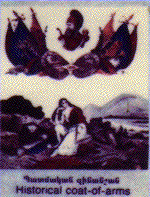 The worst thing one can do to a social animal is to shun it, to ignore
that it exists. The perceptions of the world today are exactly that, however
unintential they may be. This portion of my homepage exists that you may
know the richness of a land and people who just recently became extinct.
With the passing of my grandparents and others of their age, all of our
traditions will be lost. I have visited Armenian restaurants in search of
my grandmother's baraks. No place yet makes them as she did, and when I
describe the differences, they 've never heard of such a thing. How many
other foods, arts, wisdoms and ways have been forever lost? Perhaps we will
never know. But as this information age and the Net make this world smaller,
I will present as much as I am able to find to you, continuing to gather
fragments here of the people, my people, who lived for thousands
of years in the land which, by all Biblical accounts, once was the Garden
of Eden and the resting place of Noah's Ark. Certainly a land and people
so rich in heritage ought not to be forgotten. If nothing else, I owe it
to my grandparents, Nighan Hagop and Nevart, to remember.
The worst thing one can do to a social animal is to shun it, to ignore
that it exists. The perceptions of the world today are exactly that, however
unintential they may be. This portion of my homepage exists that you may
know the richness of a land and people who just recently became extinct.
With the passing of my grandparents and others of their age, all of our
traditions will be lost. I have visited Armenian restaurants in search of
my grandmother's baraks. No place yet makes them as she did, and when I
describe the differences, they 've never heard of such a thing. How many
other foods, arts, wisdoms and ways have been forever lost? Perhaps we will
never know. But as this information age and the Net make this world smaller,
I will present as much as I am able to find to you, continuing to gather
fragments here of the people, my people, who lived for thousands
of years in the land which, by all Biblical accounts, once was the Garden
of Eden and the resting place of Noah's Ark. Certainly a land and people
so rich in heritage ought not to be forgotten. If nothing else, I owe it
to my grandparents, Nighan Hagop and Nevart, to remember.
I'll be adding more images and information as I can, including pictures of my grandparents, other facts and, hopefully, a map of the area that is now called Turkey BEFORE it was taken from us.
An Armenian family from Musa Dagh
A full-size picture of the landscape of Armenia
| Armenian Homepage | Armenian Links | U of Mich Genocide Page |